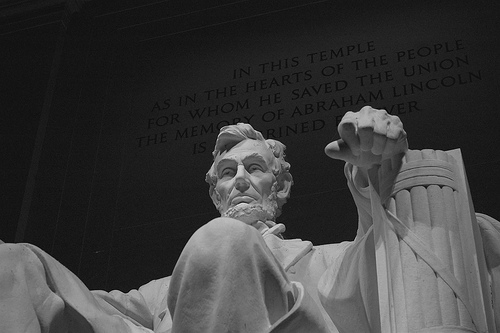We run our website the way we wished the whole internet worked: we provide high quality original content with no ads. We are funded solely by your direct support. Please consider supporting this project.

An Uneasy History
Although Abraham Lincoln is widely regarded as a tireless champion for the equal rights of African Americans, there are many indications that he held views that we would find shocking today. It’s important to understand the reality of our history to truly appreciate the challenges we face in the area of racial reconciliation today. In her New York Times article entitled A Separate Peace, Kate Masur delves into parts of our history that are sometimes hard to comprehend.
From the article:
Those interested in the history of abolition and racial equality would find few incidents in Lincoln’s presidency as dispiriting as the president’s Aug. 14, 1862, meeting with a delegation of five black men from Washington. It was dispiriting then as well: to the dismay of those hoping the Civil War would lead to full citizenship for African-Americans, Lincoln informed the delegation that “you and we are different races” and proposed that the five men be progenitors of a black colony the government would establish in Chiriquí, a region of what is now Panama.
Image by rodolfo. Used in accordance with Creative Commons. Sourced via Flickr.
Category: General
Tags: Racial Reconciliation
Related Reading

Is Racism Still a Problem? Does the Church Care?
Cliff via Compfight On Friday, we posted a piece by Greg on the importance of racial reconciliation in the Kingdom of God. (Click here to read it.) This is a part of the Synchro blog for MennoNerds on Race. Watch this video for more on the topic. The following is an illustration taken from an…

Podcast: How Much Hope Should We Have that We Can Find Unity Amid So Much Diversity?
Greg looks at Galatians 3:26-29. http://traffic.libsyn.com/askgregboyd/Episode_0370.mp3

Confessions of a Christian Nation (Racism)
In honor of Dr. Martin Luther King Jr., Greg Boyd, Brian McLaren and Brian Zahnd apologize to the African American community for the church’s complicity in the oppression of African Americans throughout American history. Video by Rex Harsin

Reversing Babel
Several generations after the flood, we read in Gen 11 how humans were still living in one locale and had one common language and culture. Then someone came up with the brilliant idea that they should construct an enormous tower that would reach “to the heavens” in order to make a name for themselves and…

Why Racial Reconciliation Matters
Rachel Held Evans invited Grace Biskie to reflect on racial reconciliation on her blog this week. Grace’s perspective is an important one to hear. Check out Church Stories: A Plea to Engage in Racial Reconciliation. From the article: The problem with disengaging is that it’s not what God intended for us. I believe God expressly…

The Coming Kingdom & Racial Conflict
In the book of Revelation, we see a glimpse into the future. John says he saw, …a great multitude that no one could count, from every nation, tribe, people and language, standing before the throne and in front of the Lamb. They were wearing white robes and were holding palm branches in their hands. And…
